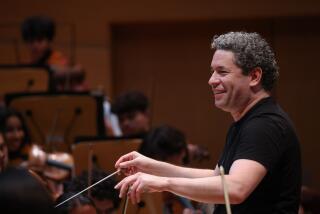MUSIC NOTES : SADDLEBACK CHORALE TO REVIVE FAURE’S REQUIEM
- Share via
Gabriel Faure’s Requiem, one of the composer’s best-known and most endearing works, was first performed in a chamber ensemble version that virtually disappeared after the full orchestra edition was published in 1900.
Conductor Alvin Brightbill will revive this 1893 chamber version with the Saddleback Concert Chorale and members of the Pacific Symphony at 8 p.m. Saturday in the Santiago de Compostela Church, 21682 Lake Forest Drive, El Toro. Soprano Janice Halcomb and baritone Robin Buck will be the soloists.
“This edition shows Faure at his intimate best, and it represents his first intention,” Brightbill said in a recent phone interview.
Actually, the edition embodies the composer’s second thoughts.
In 1888, Faure completed a five-movement Requiem--the core of the work as we know it--and premiered the work with chamber ensemble accompaniment in the fashionable church of the Madeleine in Paris.
In 1893, he added two movements for baritone solo (the “Offertoire” and “Libera me”) and increased the instrumentation somewhat by adding horn, trumpet and violin parts. This essentially is the Requiem that we know. But the accompaniment for this second performance remained chamber-sized.
The 1900 full-orchestra edition--now a third version--probably came about because Faure’s publisher believed that such an edition would make performances of the work more generally attractive.
So what’s the big deal, you may ask?
At least one scholar, John Rutter, feels that this score is--in Rutter’s words--so “extraordinarily inaccurate and full of misprints . . . (and has so) many curious infelicities in scoring” that Faure probably never even saw the printer’s proofs--and very likely did not create this score at all.
Rutter suggests that an inexperienced student of Faure’s did the deed.
Be that as it may, conductor Brightbill feels that “basically the (three) versions are the same.
“The exception is the ‘Sanctus’ where, instead of a whole violin section, the melodic line is played up an octave by a solo violin. It’s more ethereal and the melody just sails way up on the E string.
“Altogether it’s a much more intimate approach and you can do things like have the choir sing even softer than you normally would with the expanded orchestration.”
Brightbill will conduct a chorus of approximately 85 singers and a small orchestra of 12 strings, organ and harp. Robert Peterson will be the violin soloist.
Also on the program will be Faure’s “Cantique de Jean Racine,” Op. 11, a prize-winning composition written when the 20-year old composer had completed his studies at the Ecole Niedermeyer in Paris. Bach’s Brandenburg Concerto No. 2 will complete the program.
Visiting Indian dancer Alarmel Valli will perform at 7:30 p.m. Saturday in Fullerton College’s Campus Theatre.
Valli is an exponent of the Pandanallur school of Bharata natyam, one of two main styles--the other is the Tanjore--of the Southern India dance form that brings to life the stylized poses of temple sculpture. Pandanallur is characterized by its emphasis on the dancer’s grace rather than on her vigorous footwork.
Valli’s performance is sponsored by the Los Angeles-based Shakti Foundation for the Performing Arts.
The UC Irvine Concert Choir and California Chamber Singers directed by Joseph Huszti have been invited to participate with more than 200 choirs in the 1986 International Musical Eisteddfod competition, July 8--12, in Llangollen, Wales.
The competition was started in 1947 as an offshoot of the National Eisteddfod, which has been held annually since 1880.
To help underwrite costs for the trip, Huszti will conduct a benefit concert at 8 p.m. June 21 in the UCI Fine Arts Concert Hall. The program will be drawn from the competition repertory and will be feature music written by American composers--Copland, Bernstein, Norman Dello Joio and Kirke Lewis Mechem.
After the competition, the 50-member Concert Choir will perform throughout England and in Edinburgh, Scotland. The 30-member Chamber Singers will follow with a concert tour to Austria, Hungary and Czechoslovakia.
More to Read
The biggest entertainment stories
Get our big stories about Hollywood, film, television, music, arts, culture and more right in your inbox as soon as they publish.
You may occasionally receive promotional content from the Los Angeles Times.










